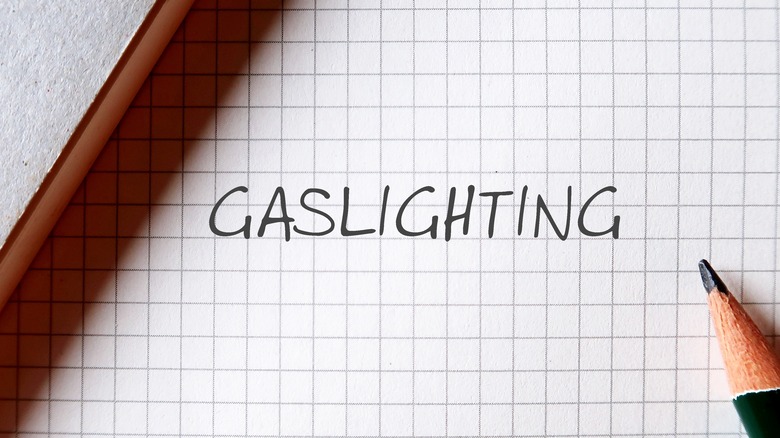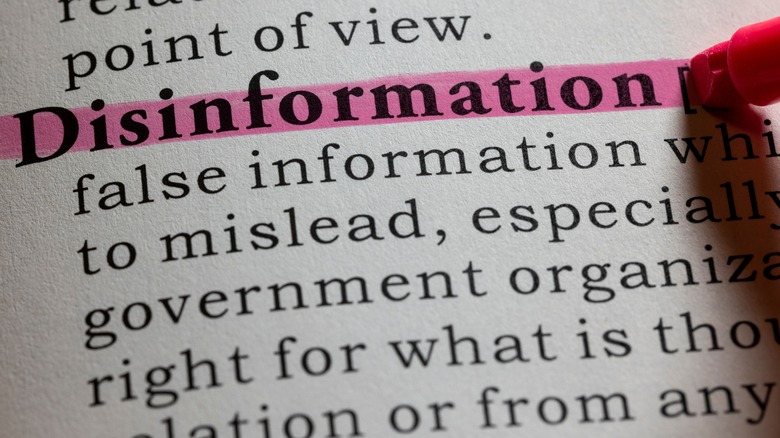Merriam-Webster Immortalizes Twitter's Favorite Term By Making It The 2022 Word Of The Year
As we head into the final months of 2022, everyone is releasing their "best of" lists. From thriller books to best movies, 'tis the season to rank things. On Monday morning, Merriam-Webster (yes, the dictionary) jumped into the fray and named what they felt was the Word of the Year (WOTY).
For decades, linguists and word nerds have been coming together to decide what the "Word of the Year" will be. In 1990, Allan Metcalf — a professor of English at MacMurry College in Illinois — told Time he began to wonder why can't the members of the American Dialect Society couldn't choose a word of the year the way the magazine chose a person of the year. When the group met in December 1990, they decided "bushlips" — a portmanteau of "Bush" and "lips" that was used to describe unfulfilled political promises — was their word of the year, per Time. It came from former President George H. W. Bush's infamous promise, "Read my lips: no new taxes."
The tradition continued with more groups like dictionary companies Merriam-Webster and the Oxford English Dictionary picking their own word of the year. But as Book Riot explains, each group has a different method of picking their WOTY. Oxford English Dictionary uses "Oxford Corpus" — their language research program — to gather words from different articles around the internet. Merriam-Webster, however, tracks the popularity of searches on their website, giving a unique look at the words people want to understand (via Book Riot).
We're not kidding, this is really the 2022 Merriam-Webster Word of the Year
To pick their Word of the Year for 2022, Merriam-Webster looks at how searches for particular words are trending. Some words that rounded out their top ten list included "Cancel culture," "Codify," and "Queen Consort," which made sense to Peter Sokolowski, Merriam-Webster's editor-at-large (via the Associated Press). What didn't make sense was that "gaslighting" had 1,740% more searches on Merriam-Webster's website than last year. According to Sokolowski, "gaslighting" is a word that's "looked up frequently every single day of the year." But, as Sokolowski points out, there was no single event that triggered the interest in the word — just a steady pervasiveness through conversations in the news and across social media.
For Ben Zimmer, the chair of the New Words Committee of the American Dialect Society, these trending words are an important "bellwether" for what's happening in society. Talking to Book Riot, Zimmer explained the process of picking a Word of the Year is "a reflection of how language is encompassing the zeitgeist of the times."
According to Merriam-Webster, the top definition of "gaslighting" is "the psychological manipulation of a person, usually over an extended period of time, that causes the victim to question the validity of their own thoughts, perception of reality, or memories and typically leads to confusion, loss of confidence and self-esteem, uncertainty of one's emotional or mental stability, and a dependency on the perpetrator."
How gaslighting became so popular
Ingrid Bergman won an Academy Award in 1944. The movie she starred in, the BBC explains, was "Gaslight" — the play-turned-movie that many believe the current use of the term is based on. Throughout the movie, Bergman had to convince the audience she was slowly losing her mind, unraveling as she begins to question everything she hears, sees, or thinks. Spoiler alert: the person she kept turning to for comfort and support — her husband — was the one gaslighting her.
"There's this implication of an international deception [with gaslighting]," Peter Sokolowski, Merriam-Webster's editor-at-large, explained to the Associated Press. "And once one is aware of that deception, it's not just a straightforward lie...It has the possibility of a strategy or a long-term plan."
After the success of Bergman's performance in "Gaslight," the BBC explains attitudes about domestic violence slowly began to change, culminating in what they call the "golden age of 21st Century Western drama." At first, stories about domestic abuse focused on the physical, but today, television shows like HBO's "Big Little Lies" and Netflix's "Unbelievable" are powerful examples of the subtle nuances of this particular form of psychological abuse and coercive control.
Sokolowski adds in the company's press release that it's not just relationship issues fueling the use of the word "gaslighting." He points to this current age of "conspiracy theories, Twitter trolls, and deepfakes," the word "gaslighting" is as much part of conversations about relationships as politics and pop culture.


